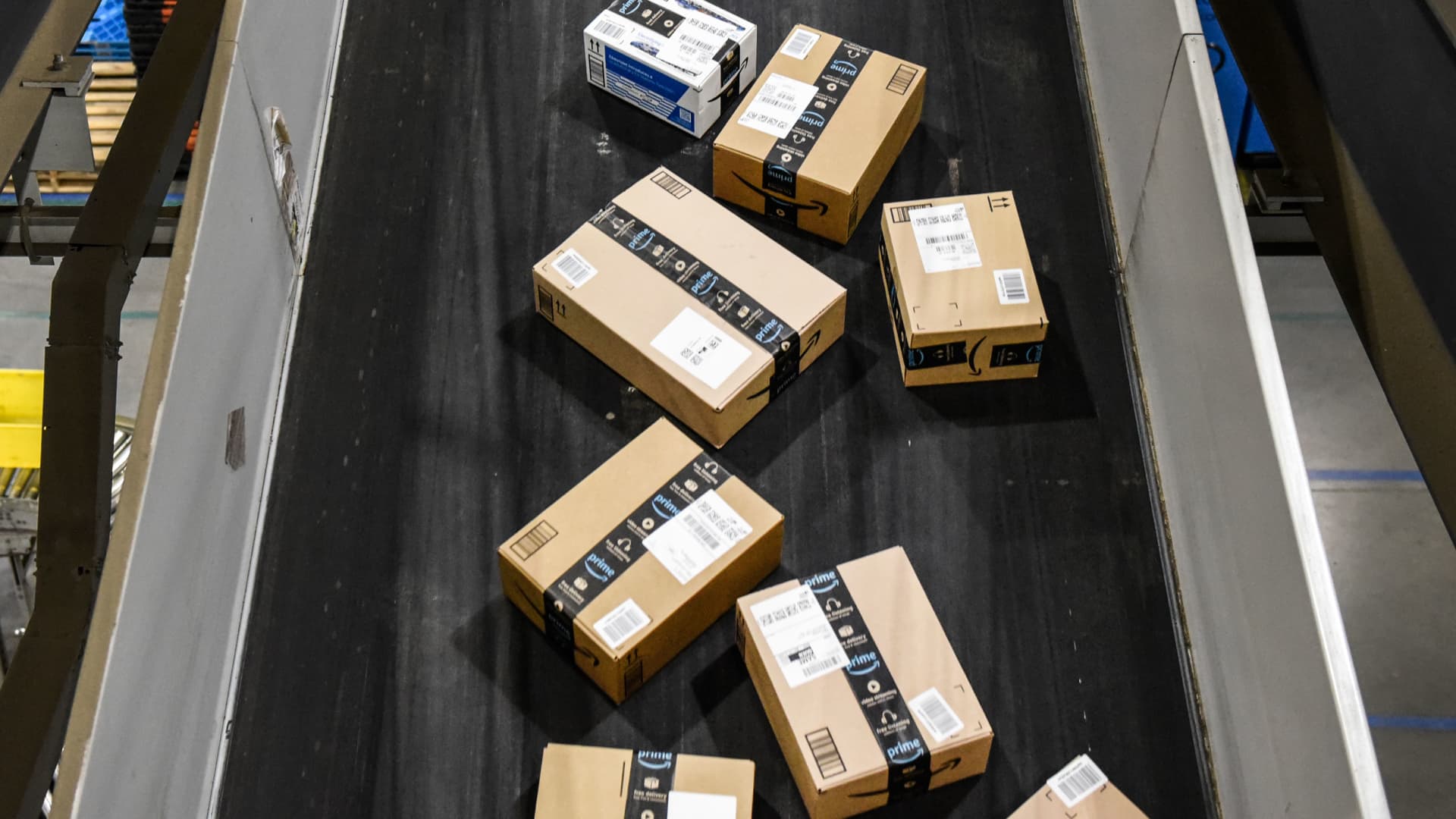
Packages move along a conveyor at an Amazon fulfillment center on Cyber Monday in Robbinsville, New Jersey, U.S., on Monday, Nov. 29, 2021.
Michael Nagle | Bloomberg | Getty Images
Chad Rubin was looking for a way to spice up his Amazon listing for a vacuum hose. He was struggling to come up with a catchy title that would make shoppers want to click on his hose instead of the countless others in Amazon’s vast marketplace.
For assistance, Rubin turned to ChatGPT, the artificial intelligence chatbot that’s gone viral since its launch late last year. He soon began to experiment with the tool for completing tasks such as generating copy on his product page. Rubin asked ChatGPT to “generate 5 insanely clever and catchy headlines” for an infographic promoting his vacuum cleaner hose.
“Dirt destroying air flow,” he said, reading off one of ChatGPT’s responses. “I would have never in a million years thought of that for a vacuum hose.”
As ChatGPT rapidly finds its way into use by lawyers, clinicians, professors and their students, it’s also showing its utility in the business world, notably for Amazon sellers seeking the tiniest competitive advantage as they try to bolster sales. Third-party merchants who have embraced ChatGPT say it can make the job of selling on Amazon’s marketplace easier and more lucrative.
A stream of YouTube videos, articles and LinkedIn posts have appeared in recent months touting the benefits of ChatGPT for Amazon sellers. E-commerce software providers such as JungleScout have also jumped on the trend by integrating ChatGPT into their services.
“This is one of those technologies that is going to fundamentally change everything we do in our lives,” said JungleScout technology chief Stephen Curial, who previously spent a decade at Amazon in software development. “It’s that powerful.”
Curial said it won’t be long before generative AI tools such as ChatGPT become ordinary productivity aides, similar to calculators or spellcheck, helping busy businesspeople minimize daily grunt work.
ChatGPT has taken the technology industry by storm since it was introduced to the public in November by OpenAI, a Microsoft-backed startup that’s reportedly held talks with investors to sell shares at a $29 billion valuation.
Millions of people are using the free chatbot to do things such as write fiction, generate computer code and edit resumes. Microsoft has incorporated the technology into its Bing search engine, while Google introduced rival chatbot Bard last month.
Investors are pouring into the market with massive checks even as the broader tech startup market continues to suffer from the 2022 downturn. Last week, a 22-person pre-revenue startup called Character.AI, which was founded by two former Google employees, raised $150 million at a $1 billion valuation in a round led by Andreessen Horowitz.
Hamza Amor, an Amazon seller and founder of e-commerce consulting firm Fussy Penguins, has posted TikTok videos showing how ChatGPT can help merchants discover their next hit product.
Amor started experimenting with ChatGPT in December, asking it questions such as “Tell me more about you” and “What is the meaning of life?” He then asked it to write small passages, such as a children’s story, and was impressed by the results.
ChatGPT helped him improve his products after he asked the chatbot to summarize what users like and dislike about an item based on a set of reviews. For an under-desk footrest, it suggested he use different packaging and more durable materials, or consider offering multiple sizes and the ability to adjust the height of the footrest.
‘It does it in seconds’
The software also assisted with the writing of a few listings, a process that normally requires hours of writing and editing.
“It does it with the tone you suggest, and it does it in seconds,” Amor said. “That’s the part that was mind-blowing.”
ChatGPT’s handiwork has already delivered results for some users. Rubin said the conversion rate, or the percentage of clicks on an ad that result in sales, went up for several of his vacuum filters, coffee filters and air filters after he used ChatGPT for help with listings. For one product, the conversion rate increased from an average of 26% to 46% over an eight-week period, he said.
Rubin sees the opportunity to further capitalize on the trend by giving other sellers a streamlined way to use it. That’s important because third-party sellers are often managing dozens, if not hundreds, of listings on Amazon at the same time and are competing with many new sellers every day.
In 2021, Rubin started a pricing software company called Profasee, which has used AI in some of its features. Rubin said he plans to incorporate ChatGPT into a new tool that will help sellers quickly fine-tune their product listings.
But despite the hype, there’s good reason for skepticism when it comes to ChatGPT’s effectiveness. The nascent technology has shown that it’s prone to making mistakes and, in some cases, just making stuff up. ChatGPT learns to write by analyzing large volumes of information from the internet, and it can get things wrong, a phenomenon that AI experts call “hallucination.”
Aidan Duffy, a seller who also runs a consulting firm, turned to ChatGPT to help improve the listing for a sauna backrest, one of his newer products. Not only did the chatbot assist with writing bullet points on the listing, it also suggested he create an adjustable backrest for taller or shorter users, which he said he considered having manufactured.
Still, Duffy said he has some concerns about the technology’s accuracy. He recently used it for advice on the best way to import products from China, where his items are manufactured.
“It came back with a readable answer, but I see it as a baseline,” Duffy said. “It won’t do your job for you.”





